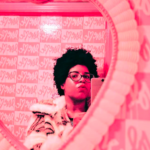Since Fenty Beauty launched and shifted the makeup industry's paradigm with its inclusivity, other brands are lagging behind.
Cosmetic companies have suddenly realized that women of color exist, and that their money is the same color as anyone else's. As brands struggle to catch up, it appears some may have employed tactics that could be offensive to the very people they are trying to target. Several brands have been called out for editing the skin tones of both black and white models to appear darker in swatch photos — and Twitter is furious.
Refinery29 recently looked into this trend and what they found wasn't great.
Makeup enthusiast Mai noticed something odd about Becca Cosmetics' swatches. The deep-skinned hand has a black palm. Anyone who has ever seen a black person knows that our palms are significantly lighter, just like every other human being's.
For comparison, check out this dark-skinned beauty rocking Juvia's Place — notice her palms have not been altered.
In an Instagram comment, Mai wrote, "So @beccacosmetics let’s have a talk about these swatches. Most people don’t have palms that are the same color as the rest of their arms, this is photoshopped as heck and it is shameful that you’re trying to promote your 'inclusive' foundation range but can’t even bother to hire real models for the swatches and are resorting to artificially coloring their arms."
Becca apologized, admitting that its photo editing missed the mark.
A spokesperson for the brand posted a statement to Instagram. "Thanks to everyone who shared feedback on our recent arm swatch image, we hear you and want you to know that we remain committed to continually representing our inclusive BECCA Beauties."
"Some insights:
Truth: The image featured four models of different ethnicities.
Truth: We acknowledge the way we adjusted the image missed the mark and are deeply sorry for this oversight.
Truth: BECCA is committed to showcasing the lightest to the deepest skin tones and hiring inclusive models for our campaigns. To demonstrate this commitment, we’ve re-shot with real girls from the BECCA office."
But this isn't the first time a brand has pulled this stunt. K-beauty brand Stylenada was also lambasted for making a black palm monotone.
Some users believe that when brands do this, they're not editing a black person's palm darker. In actuality, many believe they are Photoshopping white people to appear black.
Stylenada was forced to apologize and remove the photos.
Hand model Christina Grant told Refinery29 that after having worked with 15 brands, she has seen her hand both lightened and darkened for swatch photos.
In one instance, the makeup artist put foundation on the palms of her hands, which is apparently a common practice. “I remember one time on set, the makeup artist put all of this makeup on my hand, which is normal sometimes, but she made my hand three shades darker. I asked her if she was going to blend it out, but she said she was done," Christina said in the interview.
A report by Refinery29 investigated this odd trend and got some interesting answers.
Beauty photographer Haley Kassel told Refinery29 that if brands don't have a shade available for a model's skin tone, they'll fake the funk and Photoshop the image. Thus, sometimes swatches on a darker skin tone are even superimposed.
In fact, when Il Makiage was called out for editing a white model to appear black, they insisted they altered the shades of the foundation and not the models. How is that better?
“The models used were four diverse women, including an African-American woman,” co-founder Shiran Holtzman Erel told Refinery29. “The only digital alterations performed were in order to differentiate between the shades to help shoppers choose accurately.”
Fortunately, makeup enthusiasts like Ofunne Amaka have created the Cocoaswatches Instagram account and app, which gives an honest assessment of makeup for women of color. The deceptive practice of editing models and swatches misleads consumers who already have trouble finding makeup that suits their complexion.
Makeup brands need to step their game up. Fenty Beauty managed to make waves simply because they created an inclusive product. It is hard to justify the practice of being deceptive and further marginalizing an already marginalized group of consumers.
The only real explanation is racial bias. It is simply bad for business to exclude millions of potential customers because of the color of their skin. If the bottom line is money, then brands are choosing to miss out on potential profits when they decide they don't feel like making more shades.
According to Nielsen, black women alone spend nine times more on beauty and haircare products than our non-black counterparts, with a spending power totaling $1.1 billion annually on beauty. Moreover, it is also noted that when black people choose to consume a certain product, it adds a "cool factor," which is no surprise since black culture has always significantly shaped American trends.
“Our research shows that black consumer choices have a ‘cool factor’ that has created a halo effect, influencing not just consumers of color but the mainstream as well,” said Cheryl Grace, senior vice president of U.S. Strategic Community Alliances and Consumer Engagement, Nielsen.
And this doesn't even include women of color from other racial and ethnic groups who want makeup, too. It's about time we start showing women of color (and our dollars) some freaking respect. It's apparent we keep showing up for brands, but when will they start showing up for us?




